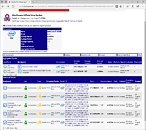- Joined
- Oct 9, 2007
- Messages
- 47,528 (7.48/day)
- Location
- Hyderabad, India
| System Name | RBMK-1000 |
|---|---|
| Processor | AMD Ryzen 7 5700G |
| Motherboard | ASUS ROG Strix B450-E Gaming |
| Cooling | DeepCool Gammax L240 V2 |
| Memory | 2x 8GB G.Skill Sniper X |
| Video Card(s) | Palit GeForce RTX 2080 SUPER GameRock |
| Storage | Western Digital Black NVMe 512GB |
| Display(s) | BenQ 1440p 60 Hz 27-inch |
| Case | Corsair Carbide 100R |
| Audio Device(s) | ASUS SupremeFX S1220A |
| Power Supply | Cooler Master MWE Gold 650W |
| Mouse | ASUS ROG Strix Impact |
| Keyboard | Gamdias Hermes E2 |
| Software | Windows 11 Pro |
Ahead of their launch later this quarter, SiSoft SANDRA benchmarks of Intel 8th generation Core i7-8700K and Core i5-8400 six-core processors surfaced in benchmark databases, which were promptly compared to their predecessors by HotHardware. The results put to the test Intel's claims of "over 40 percent more performance" compared to the 7th generation Core processors, which the company made in its 8th Generation Core Launch Event presentation. A bulk of these performance increases are attributed to the increasing core-count over generation, which directly yields higher multi-threaded performance; while a small but significant portion of it is attributed to increases in single-threaded performance. Since the "Coffee Lake" micro-architecture is essentially a refresh of the "Skylake" architecture, single-threaded performance increases could be attributed to higher clock speeds.
The Core i7-8700K is the top-dog of the 8th generation Core mainstream-desktop processor family. This six-core chip was compared to the product it succeeds in Intel's MSDT product-stack, the quad-core Core i7-7700K. There is a 45 percent increase in performance, in the "processor arithmetic" test; and a 47 percent increase in the "processor multimedia" test. These two test-suites are multi-threaded, and hence benefit from the two added cores, which in turn add four additional logical CPUs, thanks to HyperThreading. "Processor cryptography" sees a 12 percent increase. The single-precision and double-precision "Scientific Analysis" tests, which again are multi-threaded, see 26 percent and 32 percent performance gains over the i7-7700K, respectively.


The next processor on the chopping block is the Core i5-8400. This chip is of particular significance because it is expected to give you six cores around the $200-mark, and logically succeeds the Core i5-7400, and yet it was compared to the i5-7600K (which is succeeded by the i5-8600K). Despite that, we see a healthy 40 percent increase in "processor arithmetic" performance, a staggering 50 percent increase in "processor multimedia" performance, a 14 percent increase in "processor cryptography," and 30 percent and 17 percent increases in single- and double-precision "scientific analysis" results, respectively. It looks like the generational update could entice Core i5 owners more than Core i7 owners. For someone with, say, a Core i5-4670, the upgrade to an 8th generation Core i5 could bring tangible performance gains. The results also show i7-8700K to be a formidable opponent to the Ryzen 7-1800X.

View at TechPowerUp Main Site
The Core i7-8700K is the top-dog of the 8th generation Core mainstream-desktop processor family. This six-core chip was compared to the product it succeeds in Intel's MSDT product-stack, the quad-core Core i7-7700K. There is a 45 percent increase in performance, in the "processor arithmetic" test; and a 47 percent increase in the "processor multimedia" test. These two test-suites are multi-threaded, and hence benefit from the two added cores, which in turn add four additional logical CPUs, thanks to HyperThreading. "Processor cryptography" sees a 12 percent increase. The single-precision and double-precision "Scientific Analysis" tests, which again are multi-threaded, see 26 percent and 32 percent performance gains over the i7-7700K, respectively.


The next processor on the chopping block is the Core i5-8400. This chip is of particular significance because it is expected to give you six cores around the $200-mark, and logically succeeds the Core i5-7400, and yet it was compared to the i5-7600K (which is succeeded by the i5-8600K). Despite that, we see a healthy 40 percent increase in "processor arithmetic" performance, a staggering 50 percent increase in "processor multimedia" performance, a 14 percent increase in "processor cryptography," and 30 percent and 17 percent increases in single- and double-precision "scientific analysis" results, respectively. It looks like the generational update could entice Core i5 owners more than Core i7 owners. For someone with, say, a Core i5-4670, the upgrade to an 8th generation Core i5 could bring tangible performance gains. The results also show i7-8700K to be a formidable opponent to the Ryzen 7-1800X.

View at TechPowerUp Main Site







